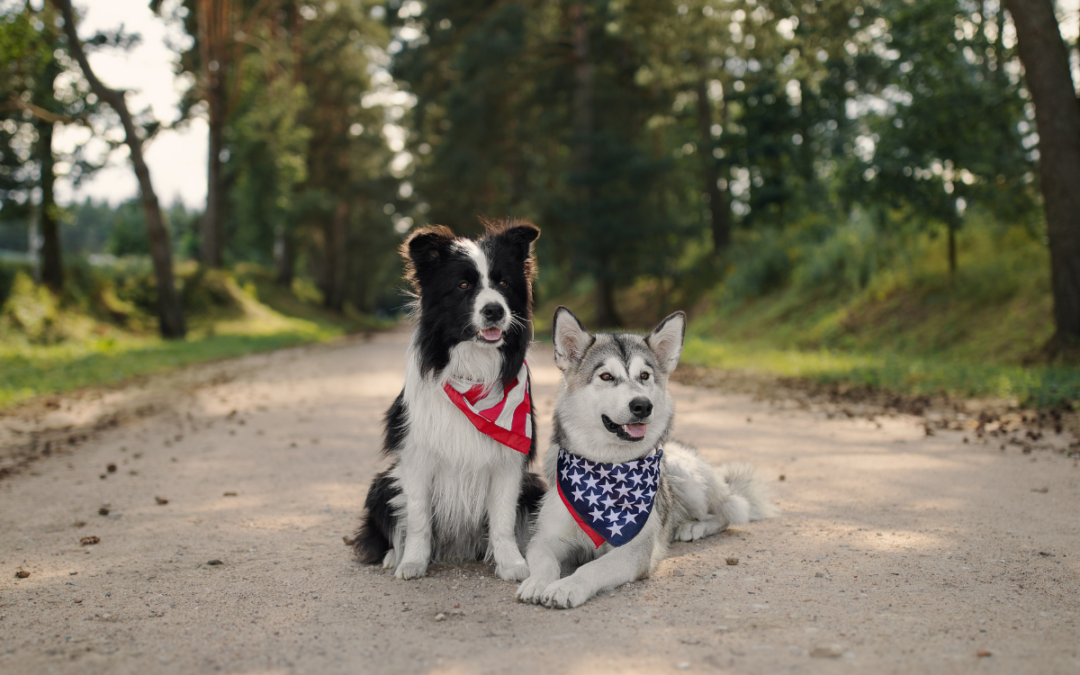As holidays go, the Fourth of July is often a welcome one. It often means backyard parties, family and friends, fireworks, and celebrating our freedom. Unfortunately, it is also the day when more pets go missing than any other day of the year, and one of the busiest for veterinary emergency hospitals. Health hazards abound, from fireworks to food, but fortunately, with a little preparation, we can help you avoid a pet emergency this summer holiday.
Fourth of July Preparation
In the weeks prior to your Independence Day celebration, take these steps to protect and prepare your pets:
- Make sure your pets are wearing their collar or harness and ID tags and that your contact information is current.
- Check that your pet’s microchip is registered with your correct contact information. Visit the American Animal Hospital Association’s Universal Pet Microchip Lookup Tool, at https://old.petmicrochiplookup.org/
- If your pet is not microchipped, consider calling your primary veterinarian ASAP to have one placed. A microchip increases the chances of your pet being returned to you should they become lost.
- Ensure your yard and fences are secure so that your pets can’t escape if they’re startled.
- Consider purchasing a pet body wrap such as a Thundershirt. An anti-anxiety pet wrap applies gentle, steady pressure and has a calming effect. In a pinch, a snug-fitting t-shirt can work the same way.
- If your pet has had serious noise aversion anxiety in the past, or if you’re worried about destructive behavior, consult your pet’s primary veterinarian. A referral to a veterinary behaviorist could help your pet to conquer their fear. Your vet may also prescribe medication to be used on or around the holiday.
Remember, these steps need to happen well before the day itself, so now is the time to start thinking about how to keep your pet safe and comfortable.
Avoiding a Pet Emergency During July 4 Celebrations
Leave them at home – Although it’s tempting to include pets (especially dogs) in July 4th fun, leave them at home if you attend fireworks shows, parties, BBQs, or other celebrations. The risk of overheating, stress, access to potential toxins, and the danger of getting lost outweighs any fun you might enjoy. Make your memories safely at home.
Create a safe haven – If you’re hosting, keep your pets inside during the festivities, and create a quiet space for them to stay in. This can be their crate, a small bedroom, laundry room, or bathroom. Fill their quiet space with soft blankets and their favorite toys. Close shades or drapes to block out bright lights, and use soft music or a white noise machine to mask loud noises.
Distract, distract, distract – During parties or fireworks, give your pet a treat-filled KONG or another favorite toy. Licking and chewing release endorphins, which help to relax your pet. Introduce these toys in the days prior to fireworks to avoid negative associations. Visit your pet often to check on them and give them your loving attention.
Avoid burns, poisoning, and trauma – Each year, our 24-hour emergency service treats pets with mouth, paw, or nose burns associated with getting too close to fireworks. Fireworks get hot very quickly and remain hot for a long time, and fireworks that move or eject upwards, if used inappropriately, can hit a pet and cause burns and trauma. Additionally, the chemicals that create beautiful colors in the sky can be toxic to pets if ingested. Don’t let your pet chase, chew, or otherwise “investigate” fireworks. Ensure all spent fireworks are cleaned up before letting pets out into the yard to ensure nothing is ingested.
Avoid the backyard grill – Giving your pet treats from the grill or backyard picnic can cause gastrointestinal upset or pancreatitis. “People foods” such as alcohol, onions, grapes, and chocolate are toxic, even lethal, for pets. Bones that are swallowed may splinter or become lodged in the intestine, requiring surgery. And corn cobs are surprisingly tempting, and won’t fit through your dog’s digestive tract. It may be hard to avoid those puppy-dog eyes, but sudden changes to your pet’s diet can result in a trip to our emergency room.
Ensure guests know the rules – When guests come to visit, make sure they know your house rules regarding your pets. You may know that table scraps can make your pet sick, but make sure you pass on your safety tips to your guests. Leave a sign on any doors or gates to ensure everyone remembers to keep them closed so pets can’t escape.
Monitor sun and heat exposure – Summer sun and heat exposure can cause heat exhaustion or heat stroke, which are medical emergencies in pets. Heat stress signs include excessive panting, restlessness, dark red or blue gums, and staggering. In warm weather, monitor your pet’s time in the sun, limit exercise, and ensure they can retreat to the shade whenever needed. Provide constant access to fresh, cool water, and never leave a pet in a parked car. If you suspect your pet may be suffering from heat exhaustion, please contact your primary veterinarian or BEVS right away.
Water safety – If your holiday plans include boating or lake or river play, ensure your pet is safe around the water by using a pet life jacket. Although most dogs can swim, some cannot, and an unexpected fall, tiredness, or a rogue wave could cause problems for any strong swimmer. Life jackets save lives.
The Fourth of July is a wonderful holiday for many of us, celebrating our great nation. Keep your pets safe and secure with these few tips, and know that Burlington Emergency Veterinary Specialists is here 24/7 through the holiday weekend and always, in the event of an emergency. Call us if you have questions or need to come in.

